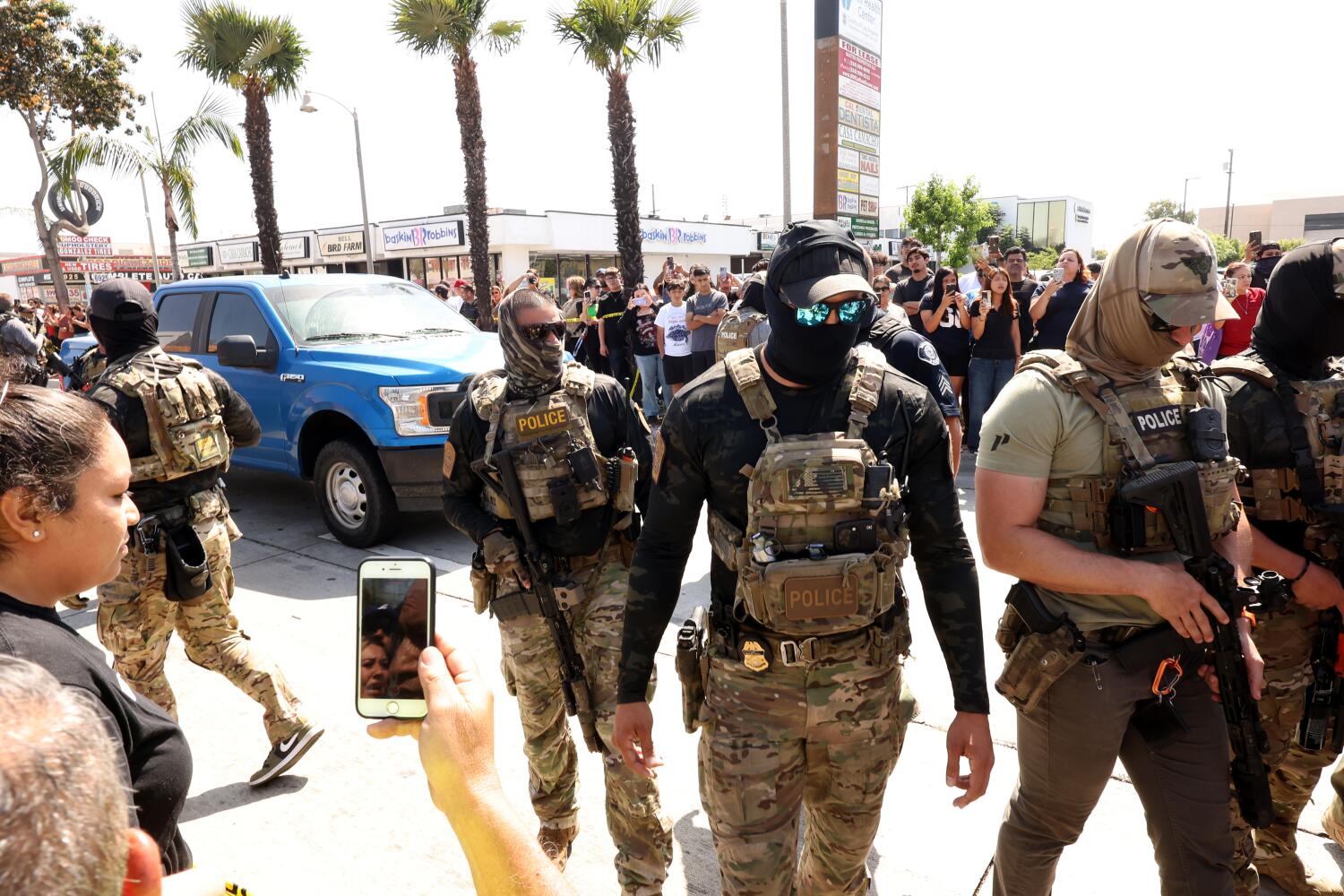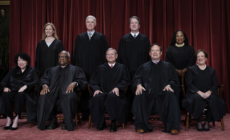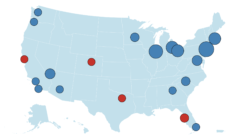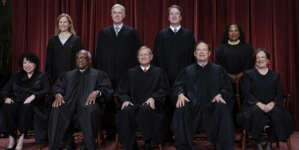-
U.S. Economy Slowed in First Half of 2025 as Tariffs Scrambled Data - 27 mins ago
-
Supreme Court’s Ideologically Split Rulings Occur Less Often Than You Think - 35 mins ago
-
Training Camp Power Rankings Sees Chiefs Unseated as AFC Kings - about 1 hour ago
-
Tsunami Reaches U.S., and Trump’s Former Lawyer Confirmed as Judge - about 1 hour ago
-
Rachel Morin’s Mother Blames Democrats for ICE Raid ‘Chaos’ - 2 hours ago
-
Here Are the Best Rides at Universal’s New Epic Universe Theme Park in Orlando - 2 hours ago
-
Nintendo Direct Coming This Week – Where to Watch and What to Expect - 2 hours ago
-
‘Anybody but Mamdani’: 5 Groups Emerge to Raise Millions in Attack Funds - 3 hours ago
-
Map Shows Where House Prices Are Rising and Falling Fastest - 3 hours ago
-
Ozzy Osbourne’s Coffin Will Be Taken Through His Hometown’s Streets Before Funeral - 3 hours ago
‘We’ll see you in court:’ L.A. County wants to bar ICE agents from concealing identity

L.A. County took a first step Tuesday toward barring immigration officers from concealing their identities with neck gaiters and masks, though it’s far from clear they’ll be able to enforce the local ban on federal agents.
County supervisors voted 4-0 to ask attorneys to draft a rule that would bar all law enforcement officers — including local sheriff deputies and federal immigration agents — from disguising their identity while working in unincorporated parts of the county.
It’s a scene that’s played out again and again since widespread immigration raids began in June: armed federal agents —their faces hidden by gaiters, balaclavas or ski masks — have hopped out of an unmarked van and apprehended people from street corners, car washes, and Home Depot parking lots. Officers often refuse to identify themselves as working with federal immigration enforcement, according to videos captured of these raids.
“Being forcibly detained by a federal officer in the middle of the day is scary enough,” said Supervisor Janice Hahn, who spearheaded the motion. “Having it done by someone wearing a face mask or balaclava whose name and badge are completely covered up is even more disturbing.”
Department of Homeland Security Assistant Secretary Tricia McLaughlin said that agents with the department’s Immigration and Customs Enforcement or Enforcement and Removal Operations need to disguise themselves to avoid having their identity publicized.
“These sanctuary politicians are trying to outlaw officers wearing masks to protect themselves from being doxed and targeted,” McLaughlin said in a statement. “These LA Country Supervisors have clearly never been on an ICE operation because they would see our officers verbally identify themselves, wear vests that say ICE/ERO or Homeland Security, and are flanked by vehicles that also say the name of the department.”
The supervisors were unconvinced.
“Unreasonable search and seizure is what I would call it,” Supervisor Hilda Solis, who co-authored the motion with Hahn, told her colleagues. “I know it is a violation of our constitutional and civil rights.”
The potential impact of the motion remains unclear. The law, which county attorneys have two months to draft, would only apply to law enforcement operating in unincorporated areas, where the supervisors have sole government authority.
Sheriff deputies are already required to clearly identify themselves in most cases. Over the last two months, Sheriff Robert Luna has stressed that his deputies should be easily identifiable across the county with their patch, six-point star badge and name plate. Hahn said the mask ban under consideration should exempt face coverings that deputies need as part of the job: gas masks, medical masks or undercover disguises, for example.
The sheriff department did not respond to a request for comment on the motion.
The Assn. for Los Angeles Deputy Sheriffs, which represents sheriff deputies, say they were in discussion with Hahn’s team to make sure officers can still wear masks when necessary.
“It’s ironic that the same Board of Supervisors who so impulsively mandated Deputy Sheriffs to wear masks during COVID have now swung 180 degrees,” said Thomas Ferguson, the vice president for the deputy union, in a statement. “I think we all know that efforts by the county and even the state on this issue will have ZERO impact on the federal government and are done largely for show.”
Federal immigration agents are under no requirement to follow a county mask ban, according to Kevin Johnson, a UC Davis School of Law professor who specialized in immigration law.
“The County cannot lawfully require ICE officers — under the jurisdiction of the federal government — not to wear masks” Johnson wrote in an email. “I believe that federal supremacy principles require the federal government to have the authority to restrict its officers.”
This comes as no surprise to the county’s top lawyer, Dawyn Harrison, who told her bosses the federal government will likely argue that the county law violates the constitution, which states that federal law takes precedence over conflicting local law.
“It would most likely be challenged on the supremacy clause,” Harrison told the supervisors.
Hahn said she saw no problem with going to battle with the federal government.
“If we have to see you in court, we’ll see you in court,” she said.
Supervisor Kathryn Barger, who abstained from the vote, questioned the point of a motion that would almost certainly land them in front of a judge.
“My concern is we’re bringing in a motion that is probably going to end up in court that I question is even legal for us to do,” said Barger, adding she worried this could give frightened residents a false sense of security.
Barger said she supported the spirit of the motion and remained concerned that it was too easy for people to impersonate immigration agents when the real ones often failed to identify themselves. The Huntington Park Police Department arrested a man in late June who they believed was posing as a federal immigration agent.
“There have probably been countless people who have been victimized because they can’t go to law enforcement because they are afraid to go to law enforcement,” said Barger.
The motion is one of several pushes by local legislators to try and exert some influence on federal agents. State Sen. Sasha Renée Pérez (D-Alhambra) introduced a bill that would require all law enforcement, unless undercover, to wear a name tag or badge number. Another bill, introduced by state Sens. Scott Wiener (D-San Francisco) and Jesse Arreguín (D-Berkeley) also seeks to ban law enforcement from wearing face coverings.
Some California Democrats in Congress also are backing a bill that would bar federal officials from covering their faces while conducting raids.
Source link




















